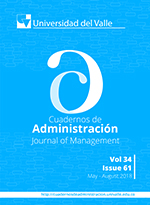Formal and informal institutions in relation to the entrepreneurial phenomenon in the Americas
Main Article Content
This paper presents the results of a study that aimed to analyze the impact of formal and informal institutions on the change of the entrepreneurial activity rate (TEA) in 9 countries in the Americas. The analysis set off from data from the GEM studies between 2005 and 2015, and data from the World Bank’s Doing Business study. The model used for the analysis was the binary choice Data Panel. The most relevant results show that formal institutions such as the cost of insolvency resolution and the financing of companies increase the TEA, but others, such as government subsidies, have a negative effect on the propensity to start a business. On the other hand, informal institutions did not display a probabilistic relationship with the TEA, which could be evidence social norms, customs, codes of conduct and so on, to be determining but unrelated to entrepreneurship for the countries and years analyzed herein.

This work is licensed under a Creative Commons Attribution-NonCommercial-NoDerivatives 4.0 International License.





